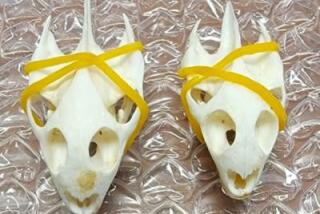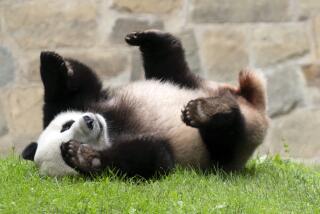Tour Targets Sale of Exotic Animal Parts : Wildlife: Taiwan officials visit breeding center to learn about preservation efforts.
- Share via
ROSAMOND — Five high-level dignitaries from Taiwan, a country where the sale of rare animal parts is commonplace, visited an exotic animal breeding center Monday to learn how the center is trying to save endangered leopards and tigers.
The Taiwanese officials drove north from Los Angeles to this high-desert community at the invitation of the caretakers of the nonprofit Exotic Feline Breeding Compound, where they petted a 4-month-old northern Chinese leopard and strolled past cages filled with growling jaguars and cougars.
The visit came in the wake of a recent U.S. trade penalty against Taiwan that could cost that country as much as $25 million a year.
U.S. officials imposed the sanctions after concluding that Taiwan was not doing enough to curb the sale of products derived from endangered animals.
Paul Ming-Shien Sun, leader of the visiting Taiwanese group and chairman of that country’s Council of Agriculture, insisted that his government is cracking down on the sale of endangered animal parts, primarily by working with African nations where the products originate.
“We are now trying to establish a network of cooperation with South Africa and neighboring countries,” Sun said after the tour. “That has been very successful, especially in the past six months.”
He said his nation has set up collection centers where the government can shelter wild animals recovered from residents who raised them as pets before stricter animal protection laws were adopted.
Nevertheless, Clinton Administration officials have said they believe Taiwan has not done enough to stop the sale of tiger bones and rhinoceros horns, from which powders are derived that some Asians believe have medicinal and sexual benefits. Wildlife experts say the demand for the items threatens the future of these animals.
To penalize Taiwan for the sales, U.S. officials last month imposed an import ban on fish and wildlife products from that nation. The ban includes jewelry made from coral and mollusk shells, shoes made of lizard and crocodile skins and other leather products.
In the wake of the ban, operators of the nonprofit Exotic Feline Breeding Compound invited representatives from Taiwan to tour their center and learn more about wildlife preservation.
The compound, founded in 1977, houses more than 50 rare cats that can be seen during public tours. About 40% belong to the compound, while the others are on loan from zoos for breeding purposes. Among the cats on view are a clouded leopard, a species that once flourished in Taiwan but now seems to be extinct there.
The operators of the cash-strapped Rosamond compound said before the group arrived that they hoped Taiwan would show its support for costly preservation efforts by providing a donation of up to $50,000. During Monday’s tour, however, the only financial aid came from Sun, who handed over $1,000 in cash, saying it was a personal donation.
He promised, however, to ask his government about additional aid.
Janette N. Dean, a volunteer at the breeding compound who set up the tour, said she was not disappointed. “Establishing the relationship was the principal purpose of the visit,” she said. “We’re trying to create a partnership so we can educate their public.”
More to Read
Sign up for Essential California
The most important California stories and recommendations in your inbox every morning.
You may occasionally receive promotional content from the Los Angeles Times.













